- Home
- W. Bruce Cameron
The Midnight Plan of the Repo Man Page 2
The Midnight Plan of the Repo Man Read online
Page 2
I swung the tow truck into the parking space next to her little Ford and in short order determined her battery was dead. She stood in a doorway and blew on her hands while I pulled out my jumper cables. “Your battery looks pretty old and the posts are corroded,” I advised, wanting to talk about anything else but her car. “I can probably get you started, but you’ll want to get a new battery.”
“Oh, great. How much does something like that cost?”
“Maybe fifty, sixty bucks. I don’t know.”
She nodded in resignation. Her car roared to life with one crank, and I disconnected the cables. “I’m so glad you came along,” she told me.
There had to be something witty I could say to that. I stood there, staring at her, trying to think what that might be.
“How much do I owe you?”
“What?”
She reached into her purse, digging out a wallet. “Oh no, no,” I protested. “No, I’m not a tow-truck driver.”
I could see the skepticism in her eyes: I was, after all, driving a tow truck.
“I mean yes, this is a tow truck, but I’m not from a towing company. It’s … it’s hard to explain.” Particularly if you want to impress someone and thus don’t want to use the term repo man. Her skin was blemish free, perfect, and her teeth were white and perfect. Probably I would think her elbows were perfect, too.
“So you just drive around looking for what, women in distress?” Her clear eyes sparkled in merriment.
“Wet women,” I affirmed. Then I realized how that might sound and wanted to throw myself on the tow hook. “I mean, from the rain. Not, uh, you know.” Oh, God.
We stood and looked at each other for a minute. “Well, thanks very much, then.”
“Ruddy. My name is Ruddy McCann.”
“Ruddy. You mean, like the complexion?” Her smile lit up her face.
“It’s short for Ruddick; it was my mother’s maiden name.” I bit my lip, remembering the reaction from the guard. Everybody used to look up to you, and then you let us down. I desperately didn’t want this woman to already know anything about me.
My name didn’t seem to register. “I’m Katie.” Her hand was cold and wet from the weather, but it warmed me when I took it.
She hesitated, perhaps sensing that I wanted to say more, and then gave me another smile. She opened her car door and slid inside. “Well thanks again, Ruddy.”
“Sure. Uh, wait!” My heart was pounding. Katie beamed her beautiful blue eyes up at me and did as I asked: she waited. My brain flailed around, groping for words. “Uh, I was wondering if maybe I could buy you a cup of coffee?” There.
“That’s sweet, but I need to get back.” Her expression seemed to indicate she really did think it was sweet, so I plunged ahead.
“Maybe some other time? Tomorrow?” Could I sound more desperate?
“Well, I’m dating somebody right now, Ruddy. So, you know…”
Yes, I knew. Pretty, intelligent women with humor in their blue eyes didn’t wander around in the gray drizzle of East Jordan, Michigan, without a man lurking somewhere in their lives. “Okay,” I told her.
She cocked her head as if to look at me from a different angle. Then she turned and dug into her purse, possibly to hand me a gun so I could put myself out of my misery. “Look.” She wrote her phone number on a piece of paper—I even found her handwriting attractive. “Coffee would be fun. Yes, I’d love to. Here.” She handed me the paper and our fingers brushed against each other. “Call me, okay?”
I spent the rest of the afternoon rewriting my conversation with Katie, talking to myself and being almost excruciatingly witty. I gave Albert Einstein Croft enough time to get home from work, then swung the tow truck up his steep driveway, hoping to find his Chevy pickup out in the open at the top.
It was there, but a severe bend at the top of the drive made it virtually impossible for me to back my tow truck up to his bumper. He’d parked his vehicle with a brick wall at one end and some cement stairs at the other, a tight parallel parking job that must have taken him some time. I couldn’t haul the thing out of there with anything less than a crane. I’d have to appeal to Mr. Croft’s sense of fairness.
I stepped out of my truck and a large white goose peeked at me from a small shed. We looked at each other with baleful expressions.
Einstein came to the door wearing an open plaid shirt and a scowl, holding a beer in his hand. He was lean, but with a soft belly spilling out over his belt. Another five years he’d be thirty and people would describe him as having a “gut.” His hair was black, long, and stringy; eyes dark and cold. He regarded me through his storm door, a “who the hell are you?” expression on his face.
“Mr. Croft? I’m McCann, from Kramer Recovery.”
“So?”
“So you want to talk through the glass, or do you want to open the door?” I asked, considerably less friendly.
He cracked open the door and a sour odor drifted out on a blast of warm air. Over his shoulder I saw pizza boxes and dirty clothes sharing the same space on the couch. “It’s about the Chevy, Mr. Croft. You’re three payments behind again and the bank sent me out to pick it up. I need you to collect your personal property out of the vehicle.”
Croft looked contemptuous. “I told them I’d pay next Thursday.”
“It’s not up to me. They said you’ve broken promises before. So unless you have those three payments, I need you to surrender the keys.”
“Get off my land.”
I put a fatherly expression on my face: time to roll out my best material. “Look, I know times are probably tough right now. But sometimes all a man’s got in life is his signature on a piece of paper, and I’ve got your signature on a contract saying if you can’t pay, you’ll surrender the vehicle. You have to stand up for your good name, Mr. Croft.”
This little speech had succeeded for me a lot of times in the backwoods of Michigan, where people often really don’t have anything left in life but their honor. Einstein’s expression was derisive.
“Kinda crap is that? You guys knew I paid late when you financed it.”
“It was financed because your dad cosigned for it. You really want us to contact your old man, tell him his son isn’t living up to his word?”
“Hell if I care.”
Milt had told me the cosigner had lost his job and couldn’t pay. I blew out a breath, exasperated. “Come on, Croft, make it easy on yourself. You really want to go around through life parking your car between brick walls so I can’t get at it? Never knowing when you’re going to come out of the bar, finally talked some babe into going home with you, and it’s gone from the parking lot? Let’s get this over with now.”
“You come on my property again, I can shoot you legal,” he responded.
“Actually, that’s not true, it has to be hunting season,” I advised.
He blinked, then twisted his expression into sour disgust and slammed the door in my face. I stood in the rain for a minute, then turned and trudged back to the tow truck. The goose observed me with an unblinking eye.
The truck was sold used, so I didn’t have the original invoice in the file. No invoice, no key numbers to access to cut myself a set of keys to his truck. Normally with used cars I just tow them away, but that wasn’t an option with the way his driveway turned and how he liked to park it. But this truck was built with one of the old-style, steering wheel-column ignitions. What I could do was slim jim the lock on his door and use a dent puller on the key collar, disabling the security lock on his steering wheel and ripping out the starter contacts before Einstein could recite the theory of relativity. Once I started the truck, though, I’d have to rock back and forth a few times before I got a good enough angle to back the thing down the driveway. He’d obviously gone through the same rocking process to park it there. If he really did have a gun in his house, I’d be a pretty easy target.
I’d have to come back later.
Midnight. I did my best work at midnight.
/>
2
Money for Nothing
The drizzle became more ambitious on the one-hour drive back to Kalkaska, making a ticking sound that meant it was changing from rain to sleet. I thought for a while about Einstein Croft’s truck, then about beautiful curly-and-brown-haired Katie, her phone number safe in my pocket, and then finally about the nightmare again.
By the time I dropped Milt’s tow truck off at the lot, the ice was coming out of the sky like bird shot, stinging my face as I hustled down to the Black Bear Bar. I pushed the door open and wiped the wet off my coat.
The bar was just starting to gather its Friday night together, some guys from the insurance agency turning their liquid lunch into an early evening and a couple of construction workers messing around at the pool table. I could tell from the pristine set of the booths that we hadn’t sold any food all day.
My sister Becky and I disagree about the kitchen she tries to run out of what had been nothing more than a place for booze back when my parents owned it, but in the end the business belonged to her and she tacked up a BAR AND GRILLE sign over the door a few months ago, as if the extra e was going to convince anyone to actually eat there.
Becky was hunched over her ledger book, chewing on the end of her pencil. “Becky, hey,” I called, sliding around the bar and pulling down a glass of beer. The spigot sputtered and spat foam. “Great,” I muttered.
“Be sure to clean the hose this time,” Becky reminded me absently.
“This time,” I shot back. More than two years had passed since I’d neglected to clean the rubber hoses that ran the beer from the keg to the tap, with the result that we served a bunch of college students a few brews with some moldy-looking crap floating on the surface. Apparently I was never to be forgiven.
Grunting loudly, I wrestled a new keg out of the back, then pointedly set about running soap and water down the hoses. “You won’t believe this dream I had.”
“Uh-huh,” she replied, so fascinated she couldn’t bring herself to look at me.
“The night of the big storm, knocked out the power?”
“That was some storm. Windy,” she answered absently.
“It was incredibly real. I’ve never had a dream like this. I was driving in the woods and these two guys hit me with a shovel.”
She glanced up. “Who?”
Becky is two years younger than I, but I can’t help but think of her as my older sister. While I was raising hell with my football buddies in high school she was always serious, like right now with her glasses smudged and her brown hair lifeless and stringy after working the bar all afternoon. It was as if she had a tapeworm or something that was always draining the fun out of her, turning her dour and sad.
It started with her teeth. Some sort of medication my mother took when she was pregnant caused Becky’s baby teeth to come in a dark gray, almost black. I’ll never forget waiting for those teeth to fall out, and the slump in my parents’ shoulders when the adult teeth finally sprouted and they were as dingy as the first set. She was the girl with the gray smile. Becky spent her whole childhood trying not to grin, and it seemed to make her mouth small, somehow, pulling her face down into a point. Bleaching at the dentist’s office eventually became affordable and effective enough that she now had a real smile, but she doesn’t deploy it very often.
“I don’t know who. Two guys. They hit me with a shovel, then they shot me.”
“Shot you,” she echoed listlessly.
I found myself somehow hurt she didn’t care more. Wasn’t she listening? I was shot. “Yes, shot! And then I died in the dream. That’s never happened to me. I mean, I could just feel myself die. Last thing I remember was lying there looking at this big old tree, and then I just slipped away.”
“And came here.” She gestured around the Black Bear Bar and Grille. “Heaven.”
“It’s bad luck to die in a dream,” I persisted. “It supposedly means you’re going to die in real life.”
“Supposedly, you are going to die in real life.”
“What’s eating you, anyway?”
She tapped her glasses with her eraser, regarding me with her sad eyes. “We’re pretty far behind on our food bill. When I called in the order this morning they wanted to know when we’ll be sending them some money.”
“Oh, that again.”
“Yes, that again.”
“Okay. I’ll talk to Milt tomorrow, see if he has something for me.” I shrugged.
“We need a thousand dollars by the end of the month.” I figured I knew why the accusatory tone: Against her wishes I’d extended some credit to a few people who’d been oddly absent from the bar since the night of my generosity. “If we don’t have it, we’ll be cut off again, have to pay cash for everything. We could go out of business.”
“Okay, I’ll talk to Milt,” I reiterated. “Man, that was a weird dream.”
“Ruddy, you’re not listening to me. A thousand dollars or we could lose the bar.”
I weighed the chances of pulling in four repos in a week. It made stealing Albert Einstein’s truck a higher priority. “I’ll think of something, okay?”
I turned away from the distress in her eyes. What could I say? This time of year was always bad for the Black Bear, all of the cash reserves sapped by the winter’s lack of business. Becky bent her head back down, tapping her pencil. I wanted to comfort her, but Becky doesn’t really do comfort. The Black Bear had been in existence our whole lives; I really couldn’t imagine it closing, despite her dire pronouncement.
I went back to cleaning up, thinking there was something else about the nightmare I needed to tell Becky. Something important, but now I couldn’t remember.
Slow night. An hour later the insurance salesmen were gone, dropping a pile of crumpled bills on the center of the table that covered the tab but left virtually nothing extra to acknowledge that Becky had been running back and forth to the bar on their behalf for four hours. I slipped the money into the till without telling her. The construction workers had added a third person to their party, which I supposed made it a crowd, but they made one pitcher of Coors last for two hours, as if having clean hoses made it taste funny. To please Becky I tried suggesting they might like some nachos and they acted as if I were joking.
I couldn’t blame them; our nachos tasted like roofing material.
Claude and Wilma Wolfinger made a boisterous appearance at around eight o’clock, looking as if they had already invested a considerable amount at one of Becky’s competitors. They were both sixty years old and it seemed like they had been married for at least that long.
Claude waved at me expansively. “Ruddy, come here a minute,” he greeted.
Claude was a thin man with white hair growing from his wiry, spotted arms. His cheekbones were nearly always red from the harsh weather and the strong drink he used to ward off the cold. His shirt proudly stated that he was a mechanic at a used car dealership, and his hands were never quite clean. When I was a little boy he and Wilma would sit in the Black Bear and regale me with stories of the world travels they were about to undertake. Twenty years later and he was still here in Kalkaska, overhauling truck engines.
Wilma worked for the county, patiently telling people they were in the wrong line or that they had filled out the wrong form. She was an inch taller than Claude’s five foot eight and outweighed him by fifty pounds. She wore violently bright colors and huge sparkly earrings that resembled miniature chandeliers. Some of Wilma’s ancestors were here when the white man came and apparently liked the new arrivals enough to marry them—all that remained of her Native American heritage was her black hair and dark eyes, but it was enough to give her a bit of an exotic look, particularly when she was angry at Claude, which frequently happened at the Black Bear. They always paid for whatever dishes they threw at each other.
“Ruddy, Ruddy, come sit down,” Claude urged, clamping a hand on my wrist. Wilma was smiling at me joyfully, positively beaming. That they were this happy together was so
unnatural it made me instantly suspicious.
“Ruddy, I’ve got a plan that is going to make us all rich.”
“I haven’t got any investment capital, Claude.”
“No! Listen.” He winked at Wilma and she nodded encouragingly. “You can say good-bye to your finances with this one, Ruddy.”
“That’s exactly what I’m afraid of.”
“What?” Claude asked, puzzled.
“He means your finance problems, Ruddy,” Wilma corrected. “This is going to fix everything.”
Claude was looking over my shoulder, his face drawing tight. “This deal’s just for us,” he said hurriedly, “so don’t say anything to Jimmy about it. Act natural!”
I turned. Jimmy Growe was making his way across the floor to my table, his face scrunched in concern. “Hey, Claude. Hi, Wilma. Ruddy,” he greeted us.
“Hi, Jimmy,” Wilma responded softy, while Claude and I acted natural. Wilma was reacting to Jimmy because she couldn’t help herself; he has a clean, innocent face that seems to make women want to mother and love him from the moment they see him. He was what I think they call “black Irish”: green eyes, smooth skin, jet-black hair—he looked like a movie star and had even been in a TV commercial once, though his career as an actor was somewhat hampered by his inability to act.
“Ruddy, you got a minute?”
Claude’s hand grabbed my wrist again in a firm message I ignored. “Sure, Jimmy, everything okay?”
He eyed Claude and Wilma. “Uh, I need to talk to you. It’s kinda important.”
I struggled to my feet, Claude clinging to me like a wrestler. “Okay, sure, let’s go over by the bear.” I gave Claude a look and he reluctantly released me.
“See you in a minute, then, Ruddy,” he told me, with so much emphasis I half expected him to pull out a stopwatch.
Jimmy and I wandered across the bar to the bear. When I was nine years old my father and my uncle shot one of the last black bears seen in Kalkaska County, a fact that gave him no end of pride back then and which now occasionally came up as a barbed reference by the environmentally minded editors of the local paper. The carcass was taken to a taxidermist, who stuffed it full of, well, stuffing, and posed the animal in a position of fierce anger, its teeth bared and its arms lifted for a totally unbearlike attack. My dad nicknamed the bear Bob. Not too many people wanted to sit under it and get drunk, so Jimmy and I were alone. We pulled our chairs up to a small table and sat, Jimmy hunched over in a position of such distress that I was sure he’d gotten a girl pregnant. I crossed my arms and waited for him to find his way to the right words.

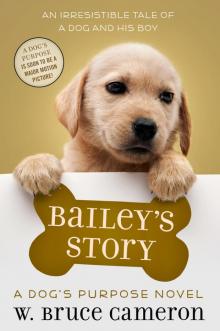 Bailey's Story: A Dog's Purpose Novel
Bailey's Story: A Dog's Purpose Novel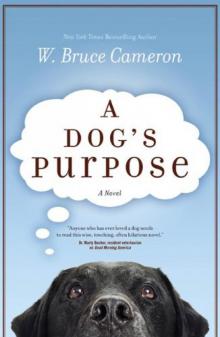 A Dog's Purpose
A Dog's Purpose Ellie's Story
Ellie's Story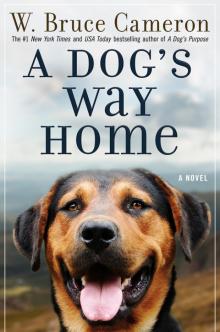 A Dog's Way Home
A Dog's Way Home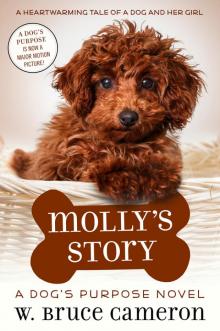 Molly's Story
Molly's Story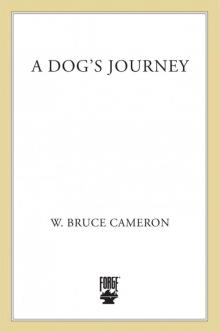 A Dog's Journey
A Dog's Journey The Dogs of Christmas
The Dogs of Christmas A Dog's Perfect Christmas
A Dog's Perfect Christmas Lily to the Rescue: Lost Little Leopard
Lily to the Rescue: Lost Little Leopard Bella's Story
Bella's Story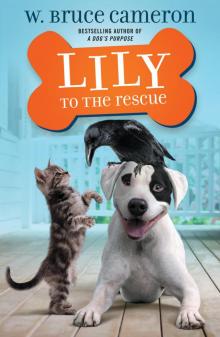 Lily to the Rescue
Lily to the Rescue Lily to the Rescue: The Not-So-Stinky Skunk
Lily to the Rescue: The Not-So-Stinky Skunk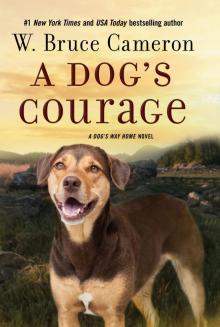 A Dog's Courage--A Dog's Way Home Novel
A Dog's Courage--A Dog's Way Home Novel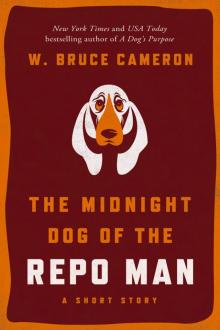 The Midnight Dog of the Repo Man
The Midnight Dog of the Repo Man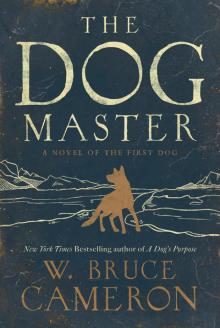 The Dog Master: A Novel of the First Dog
The Dog Master: A Novel of the First Dog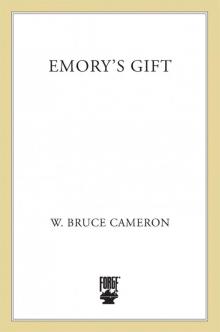 Emory's Gift
Emory's Gift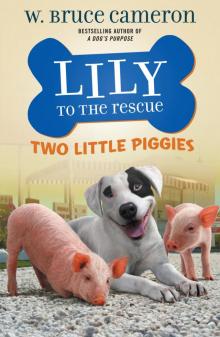 Lily to the Rescue: Two Little Piggies
Lily to the Rescue: Two Little Piggies Lily to the Rescue: The Misfit Donkey
Lily to the Rescue: The Misfit Donkey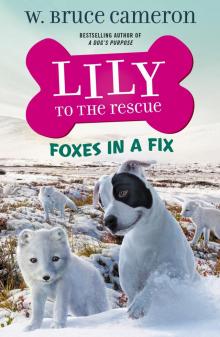 Lily to the Rescue: Foxes in a Fix
Lily to the Rescue: Foxes in a Fix Lily to the Rescue: Dog Dog Goose
Lily to the Rescue: Dog Dog Goose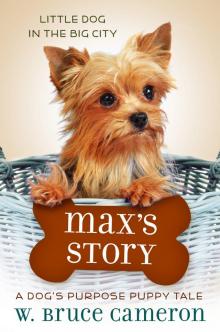 Max's Story
Max's Story A Dog's Purpose Boxed Set
A Dog's Purpose Boxed Set Toby's Story
Toby's Story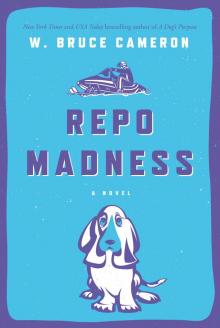 Repo Madness
Repo Madness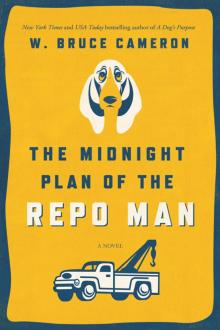 The Midnight Plan of the Repo Man
The Midnight Plan of the Repo Man Shelby's Story
Shelby's Story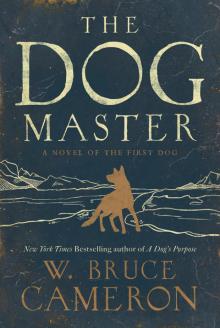 The Dog Master
The Dog Master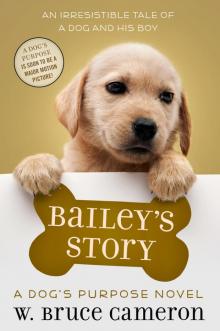 Bailey's Story
Bailey's Story